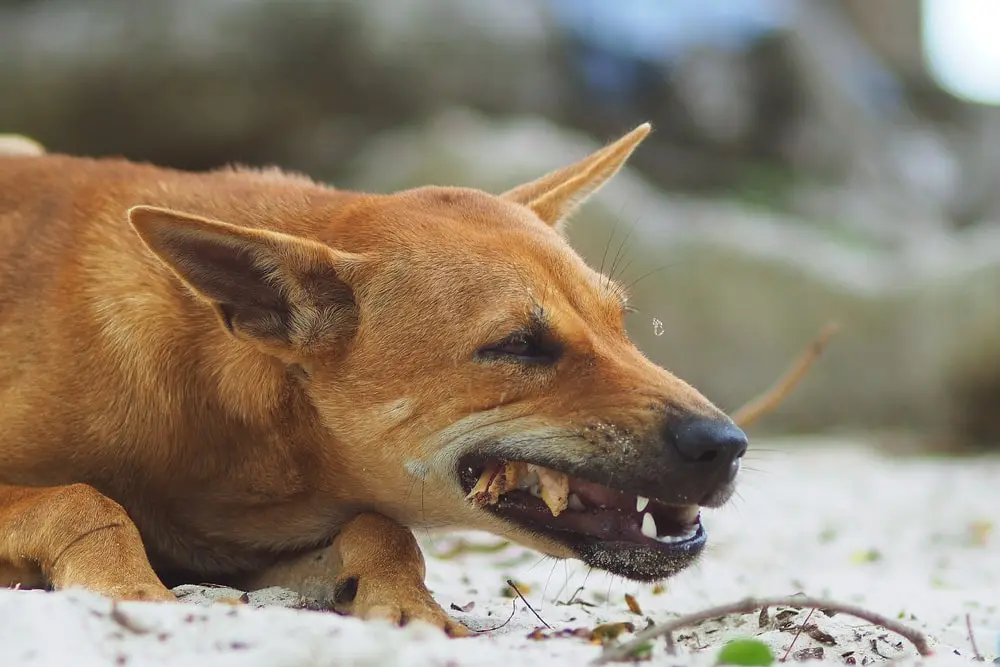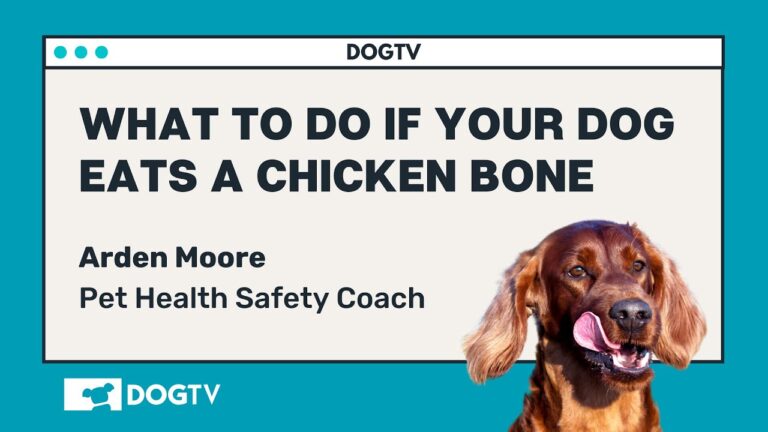If a dog eats a chicken bone, immediately monitor for symptoms of distress. Contact a veterinarian for advice and possible examination.
It’s not uncommon for dogs to consume chicken bones, but it can pose serious health risks. Sharp bone fragments can cause internal injuries, so it’s crucial to act promptly. Keep an eye out for signs like vomiting, lethargy, or abdominal pain.
Contact your vet, who may recommend monitoring the dog closely at home or bringing them in for a check-up. To prevent such incidents, be vigilant about disposing of bones safely and consider providing appropriate chew toys to satisfy your pet’s natural urge to gnaw. By taking these steps, you can safeguard your furry friend’s well-being and enjoy peace of mind.
Recognizing The Danger
Dogs are notorious for their curious nature, and sometimes, this curiosity can lead them to ingest items that they shouldn’t. One such dangerous item is a chicken bone. While dogs may see it as a tasty treat, it can pose serious health risks. As responsible pet owners, it’s crucial to recognize the danger that a dog eating a chicken bone can present, and take appropriate action to ensure their health and well-being.
Choking Hazard
Chicken bones, especially cooked ones, can splinter easily and create a choking hazard for dogs. These sharp bone fragments can lodge in their throat or cause an obstruction in their digestive tract. It’s essential to be aware of the symptoms of choking to act promptly and potentially save your furry friend’s life.
If your dog is choking on a chicken bone, they may exhibit the following signs:
- Difficulty breathing or excessive panting
- Pawing at their mouth or face
- Whining or making unusual sounds
- Visible distress and anxiety
If you notice any of these signs, do not hesitate to take immediate action. It’s crucial to remain calm and perform the Heimlich maneuver for dogs:
- Stand behind your dog, placing your hands just below their ribcage
- Make a fist with one hand and grasp it with the other
- Apply firm pressure inward and upward, using quick thrusts
- Repeat these thrusts until the object is dislodged or your dog can breathe normally
If the choking persists or your dog loses consciousness, it’s vital to seek emergency veterinary care immediately. Time is of the essence in these situations as it can mean the difference between life and death for your beloved companion.
Bone Fragments
Even if your dog manages to swallow a chicken bone without choking, there are still risks to consider. Bone fragments can cause serious internal injuries and puncture your dog’s digestive system. It’s essential to keep a close eye on them and watch for potential signs of distress.
If your dog has ingested a chicken bone, monitor them for the following symptoms:
| Symptoms | Description |
|---|---|
| Vomiting | Presence of blood or bone fragments in the vomit |
| Diarrhea | Blood in stool or abnormal consistency |
| Abdominal pain | Whining, restlessness, or sensitivity when touched |
| Lethargy | Unusual tiredness or lack of energy |
If your dog exhibits any of these symptoms, it’s crucial to contact your veterinarian immediately. They will be able to assess the situation and determine the best course of action, which may involve diagnostic tests, medication, or even surgery, if necessary.
Remember to always prioritize your dog’s safety and well-being by keeping chicken bones and other potential hazards out of their reach. Prevention is key to avoiding the dangers associated with improper bone ingestion and ensuring your furry friend stays happy and healthy.

Credit: www.broadway4pets.com
Assessing The Situation
When a dog eats a chicken bone, it can be a cause for concern. It’s important to assess the situation promptly to ensure the well-being of your pet. Follow these steps to evaluate the condition of your dog after consuming a chicken bone.
Observe The Dog
- Examine your dog for any signs of distress or discomfort.
- Look for any symptoms such as drooling, pawing at the mouth, or difficulty breathing.
- Observe the dog’s behavior to see if it is acting abnormally or in pain.
Check For Symptoms
- Inspect the mouth and throat for any lodged bone fragments or bleeding.
- Monitor the dog for signs of gastrointestinal distress such as vomiting, diarrhea, or abdominal pain.
- Keep an eye out for any changes in appetite or lethargy.
Assessing the situation promptly after a dog ingests a chicken bone is crucial for their well-being. By observing the dog and checking for symptoms, you can determine the appropriate course of action to ensure the safety and health of your pet.
What Not To Do
If your dog has ingested a chicken bone, it’s important to remain calm and take the necessary steps to ensure their safety. Knowing what not to do in this situation can be crucial in preventing any further harm to your furry friend. Here are the key actions to avoid in the event of a dog consuming a chicken bone.
Do Not Panic
Panicking can lead to irrational decisions and actions that may not be beneficial for your dog’s well-being. Try to stay composed and assess the situation rationally before taking any steps.
Do Not Induce Vomiting
In the case of a dog ingesting a chicken bone, it is vital not to induce vomiting. Doing so can potentially cause the bone to splinter, leading to further internal damage or throat injuries. Avoid any attempts to induce vomiting without professional advice.

Credit: www.metlifepetinsurance.com
Seeking Veterinary Assistance
If you suspect that your dog has eaten a chicken bone, seeking veterinary assistance is crucial. Dogs can suffer from various complications when consuming sharp bones, such as digestive tract damage, choking hazards, and blockages. In this section, we will outline the necessary steps to take when seeking help from a veterinarian.
Call The Vet
As soon as you realize your dog has ingested a chicken bone, it is important to contact your veterinarian immediately. Provide them with all relevant information, including breed, size, and age of your dog, as well as when the incident occurred. This will allow the vet to assess the situation and provide you with appropriate advice.
Follow Professional Advice
After explaining the situation to your veterinarian, they will provide you with expert guidance on the next steps to take. It is crucial to follow their advice carefully. They may ask you to bring your dog to the clinic for examination or provide instructions for at-home monitoring. Regardless of the advice given, it is important not to administer any medications or home remedies without your veterinarian’s approval.
Your veterinarian may recommend the following actions:
- Monitoring: In some cases, the vet may advise you to monitor your dog closely for any signs of discomfort or distress. They will provide you with specific symptoms to look out for, such as vomiting, diarrhea, or difficulty breathing.
- Diagnostic Tests: Depending on the potential severity of the situation, your vet may suggest diagnostic tests, such as X-rays or ultrasounds, to assess the location of the bone and determine if any damages have occurred.
- Inducing Vomiting: If the incident happened recently and the bone is still in the stomach, your vet may recommend inducing vomiting to help expel the bone. However, this should only be done under their supervision, as it can be dangerous in certain situations.
- Surgical Intervention: In more severe cases, where the bone has passed into the intestines or caused damage, surgery may be necessary. Your vet will discuss the potential risks and benefits of surgery and guide you through the process.
Remember, time is of the essence when it comes to a potential canine emergency. Don’t hesitate to contact your veterinarian immediately to ensure your dog receives the necessary care and treatment. Seeking prompt professional assistance can greatly increase the chances of a positive outcome and protect your furry friend’s health.
Preventing Future Incidents
Once your dog has safely passed through the ordeal of eating a chicken bone, it’s important to take measures to prevent this from happening again in the future. By implementing a few simple strategies, you can minimize the risk and keep your dog safe and healthy.
Proper Bone Disposal
Properly disposing of bones is crucial to ensure your dog doesn’t have access to them. Here are some guidelines to follow:
- Wrap leftover chicken bones in a double-bagged plastic bag to prevent odors from attracting your dog.
- Dispose of the bag in a secure outdoor trash bin with a lid that your dog can’t open.
- Avoid throwing bones in the kitchen or bathroom trash cans, as these are easily accessible to your dog.
- If you have multiple dogs, monitor them closely during bone consumption to prevent any incidents.
Dog-proofing The House
Creating a safe environment for your four-legged friend is essential. Take these precautions to dog-proof your house:
- Store trash cans in cabinets with childproof locks, or choose ones with lids that are difficult for your dog to open.
- Avoid leaving food scraps or discarded bones within your dog’s reach, particularly on countertops or low coffee tables.
- If you have a backyard, ensure it is securely fenced to prevent your dog from gaining access to neighbor’s trash or other potential hazards.
- Regularly inspect your yard for any hazards that may entice your dog, such as leftover food or bones.
By implementing these preventative measures, you can significantly reduce the risk of your dog eating a chicken bone and facing the associated health risks. Remember, prevention is always better than cure!

Credit: www.akc.org
Frequently Asked Questions Of What To Do If A Dog Eats A Chicken Bone
Can Dogs Eat Chicken Bones?
Dogs should not eat chicken bones as they can splinter and cause injuries to the dog’s throat, stomach, or intestines. If a dog accidentally ingests a chicken bone, it is recommended to monitor them for any signs of discomfort or digestive issues.
It is best to consult with a veterinarian for further guidance.
What Should I Do If My Dog Eats A Chicken Bone?
If your dog eats a chicken bone, remain calm and assess the situation. Do not induce vomiting unless directed by a veterinarian. Monitor your dog for any signs of discomfort, such as vomiting, abdominal pain, or lethargy. Contact your veterinarian immediately for guidance and to determine the next steps to ensure your dog’s safety.
What Are The Risks If A Dog Ingests A Chicken Bone?
When a dog ingests a chicken bone, there is a risk of the bone splintering and causing injuries to the digestive tract. It can lead to complications such as choking, blockages, or internal injuries. If you suspect your dog has eaten a chicken bone, it is essential to seek veterinary care promptly to minimize potential risks and ensure your dog’s health and well-being.
Conclusion
In case your dog accidentally consumes a chicken bone, it is essential to act swiftly to ensure their safety. By following the steps we’ve discussed, such as monitoring for signs of distress, contacting your veterinarian, and making dietary adjustments, you can effectively manage the situation.
Remember, prevention is key – always be mindful of proper food disposal and pet safety to avoid potential hazards.



